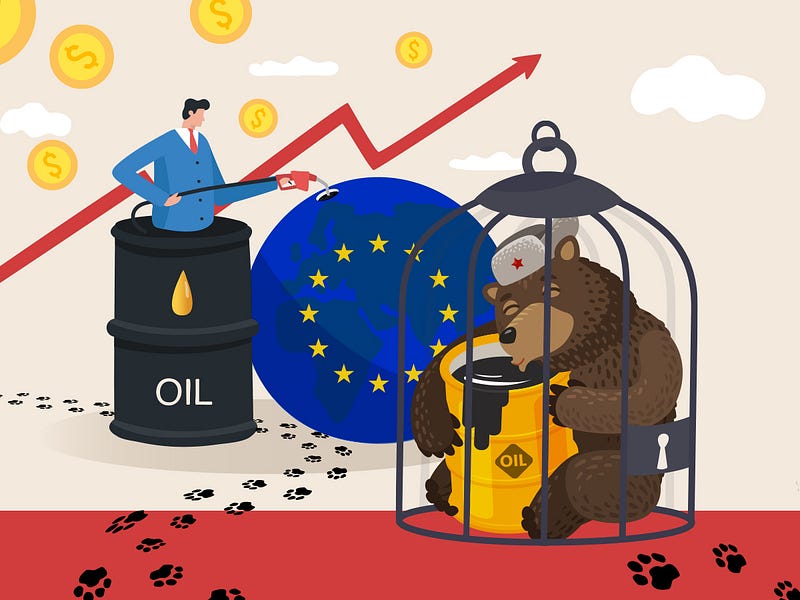
By the end of the fourth month of Russia’s war in Ukraine, I cannot dismiss my increasing concerns from my thoughts not only about the future energy supply of Ukraine, but the security of European supplies in general, including the safety of my personal needs.
After the approval of the 6th sanctions package against Russia, Europe has entered the final phase to cut off its long-standing energy ties with Moscow. Given the huge differences in the level of dependence on Russian energy resources, the EU member states are far from what can be called a united front.
In some parts of the European Union, the rejection of Russian oil and gas can be accomplished relatively easily. For Western European countries (with the exception of Germany), which economies use very little or no Russian fuel, the rejection of Russian energy resources is a moral matter, which allows of no delay. By means of existing seaports, the supplies of these states are ensured in any case, consequently, having spent some time and money on new supply agreements they will certainly will be able to cope with the task in the near future.
Some Eastern European countries are in a much less favourable position. Considering the possibilities of abandoning Russian oil, they face huge problems whether they will be able to phase out Russian this basic commodity at all, and if so, at what price. In this regard, I mean the financial aspects of a change over from Russian oil of Urals mark to Brent which, in the future should come by some mysterious routes but not by existing pipelines. Some Central European countries such as Slovakia, the Czech Republic and Hungary are heavily dependent on Russian oil, which enters these countries through the old Soviet pipelines. Studying the potential costs of such a large-scale transition, the latter country has already asked the EU to provide financial support for the transition. As part of the 6th package of sanctions, at the request of the above-mentioned EU member states, a temporary exception applies for imports of crude oil by pipelines into those EU member states that, due to their geographic location, suffer from a special dependence on Russian oil, and do not have viable alternatives. Moreover, Bulgaria and Croatia will also receive temporary benefits concerning the import of Russian seaborne crude oil and certain petroleum products.
And now, let’s see how Europe is trying to cope with the consequences of the energy sanctions, imposed by Brussels itself. European countries have taken a number of measures to mitigate the effects of the rising energy prices.
The majority of countries have adopted price policy measures. The increasing fuel prices are prompting governments to boost subsidies or trim taxes to protect the customers. Only a few states, namely Bulgaria, the Czech Rep, Cyprus, Hungary, and recently Croatia apply various forms of market intervention, using various tools to achieve their own goals. While Bulgaria provides state aid to individual consumers for the payment of fuel, Hungary has introduced a retail price cap on fuel. Thanks to this measure, Hungary sells petrol at the lowest price in the retail trade, but only for Hungarian-registered vehicles. EU Internal Market Commissioner Thierry Breton has already warned Budapest over its discriminatory fuel pricing. Following Hungary, Croatia also adopted a retail price limit.
Here are some figures illustrating the situation on the Old Continent after the introduction of the sanctions (fuel price per litre):
Finland and Denmark are at the top of the list with EUR 2,5, followed by Greece and the Netherlands (EUR 2,3). In France and Austria, the petrol price is at EUR 2, which is slightly higher than in Germany (EUR 1,9). Both in Serbia and Ukraine, drivers have to pay EUR 1,6 for petrol. Following that fuel price was capped, Hungary sells petrol at the lowest (fixed) price HUF 480 ≈ EUR 1,2). Also due to a retail price cap, which is not applied along the highways, the petrol costs EUR 1,89 in Croatia.
(Three short notes to the above: 1.) Serbia is included in this compilation because I wanted to show the fuel price in a country that does not apply anti-Russian sanctions. 2.) Ukraine is listed above in the capacity of my beloved and war-torn fatherland where fuel may become one of the most precious articles in the near future. 3.) Judge for yourself whether the countries applying price restrictions deserve a fine from the Commission for a move which allows local residents to buy fuel at almost regular price.)
After looking into the details, please, we need to be sincere with ourselves! Reaching an agreement on Russian oil embargo was widely viewed as a success story across Europe. The current situation in Europe, including the terribly high prices at the petrol stations, already foreshadows the future trends and, for me, it does not seem like a success story. It is quite obvious that the European economy has already been hit hard, and is suffering from its own sanctions policy. I do accept all arguments respecting the need for Europe’s energy independence from Russia, but I think it is very unfair to pass the price of the embargo to citizens.
Leave a Reply